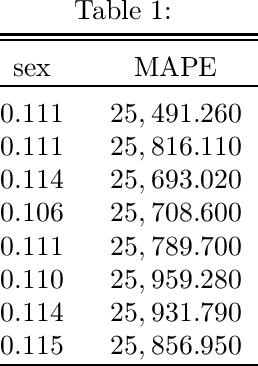Wenxi Zhang
Robust Learning Based Condition Diagnosis Method for Distribution Network Switchgear
Nov 14, 2023Abstract:This paper introduces a robust, learning-based method for diagnosing the state of distribution network switchgear, which is crucial for maintaining the power quality for end users. Traditional diagnostic models often rely heavily on expert knowledge and lack robustness. To address this, our method incorporates an expanded feature vector that includes environmental data, temperature readings, switch position, motor operation, insulation conditions, and local discharge information. We tackle the issue of high dimensionality through feature mapping. The method introduces a decision radius to categorize unlabeled samples and updates the model parameters using a combination of supervised and unsupervised loss, along with a consistency regularization function. This approach ensures robust learning even with a limited number of labeled samples. Comparative analysis demonstrates that this method significantly outperforms existing models in both accuracy and robustness.
A Novel Regularization Approach to Fair ML
Aug 13, 2022
Abstract:A number of methods have been introduced for the fair ML issue, most of them complex and many of them very specific to the underlying ML moethodology. Here we introduce a new approach that is simple, easily explained, and potentially applicable to a number of standard ML algorithms. Explicitly Deweighted Features (EDF) reduces the impact of each feature among the proxies of sensitive variables, allowing a different amount of deweighting applied to each such feature. The user specifies the deweighting hyperparameters, to achieve a given point in the Utility/Fairness tradeoff spectrum. We also introduce a new, simple criterion for evaluating the degree of protection afforded by any fair ML method.
Federated Extra-Trees with Privacy Preserving
Feb 18, 2020



Abstract:It is commonly observed that the data are scattered everywhere and difficult to be centralized. The data privacy and security also become a sensitive topic. The laws and regulations such as the European Union's General Data Protection Regulation (GDPR) are designed to protect the public's data privacy. However, machine learning requires a large amount of data for better performance, and the current circumstances put deploying real-life AI applications in an extremely difficult situation. To tackle these challenges, in this paper we propose a novel privacy-preserving federated machine learning model, named Federated Extra-Trees, which applies local differential privacy in the federated trees model. A secure multi-institutional machine learning system was developed to provide superior performance by processing the modeling jointly on different clients without exchanging any raw data. We have validated the accuracy of our work by conducting extensive experiments on public datasets and the efficiency and robustness were also verified by simulating the real-world scenarios. Overall, we presented an extensible, scalable and practical solution to handle the data island problem.
 Add to Chrome
Add to Chrome Add to Firefox
Add to Firefox Add to Edge
Add to Edge